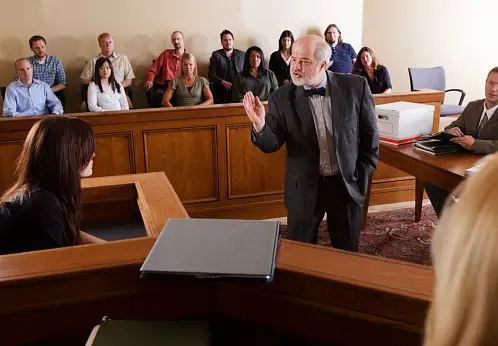Are you fascinated by the courtroom drama you see on TV? Actual court hearings are equally enthralling. At the heart of our justice system is the principle of a fair trial. Dive into the intricate world of legal proceedings and court hearings with us, where we focus on justice, fairness, and the pivotal importance of evidence in delivering rightful outcomes.
What Is a Fair Trial?
In the realm of justice, a fair trial stands as the bedrock, a fundamental principle ensuring that the legal system operates with integrity and equity. At its core, a fair trial is not just a procedural formality; it embodies the essence of justice itself, guaranteeing every individual their right to a dignified and legal process.
The principle of equality before the law is central to the concept of a fair trial. Every individual is entitled to a fair and fair hearing. This principle stresses the idea that justice should be blind and tireless in its commitment to treat all parties in a legal dispute with parity.
Key Components Of a Free Trial
A fair trial begins with the right to legal representation. This right ensures that everyone can present their case fully with expert legal help. Legal counsel is vital, serving not just as a formality but as a means to level the playing field when navigating the complexities of the legal system.
Transparency in court hearings is another crucial aspect of justice. Open, public trials enhance accountability and deter power abuses. Public scrutiny of court hearings fosters trust in the judicial system’s integrity.

Fair trials also depend on the impartiality of judges and jurors. They must remain neutral, free from outside influences, making decisions based solely on the case’s facts and the law. Any bias undermines public trust in justice.
The rules of evidence are key to a fair trial. Only relevant, reliable, and legally obtained evidence should be allowed. This exclusion safeguards the trial’s integrity, emphasizing that justice relies on sound reasoning, not dramatics.
The right to confront and cross-examine witnesses is fundamental. It lets the accused challenge the evidence against them, protecting their rights and aiding in the truth-finding process.
A fair trial encompasses more than just the courtroom proceedings. It includes pre-trial and post-trial stages. Ensuring adequate preparation time, access to necessary information, and the right to appeal are vital to uphold justice throughout the legal process.
The Necessary Components Of a Fair Trial

In the intricate realm of law, the cornerstone of a just and equitable legal system lies in the concept of a fair trial. A fair trial is not merely a legal formality; it is the bedrock of a democratic society, ensuring that individuals are accorded their fundamental rights and liberties. Let’s dissect the necessary components that collectively contribute to the orchestration of a fair trial, where the scales of justice are delicately balanced, and the sanctity of the judicial process is upheld.
Impartial Judiciary:
At the heart of a fair trial is an impartial judiciary. The presiding judge must be unbiased, free from any preconceived notions, and devoid of personal prejudices. This impartiality ensures that the proceedings are conducted with a commitment to justice rather than favoring any party involved.
Right to Legal Representation:
Central to the fairness of any trial is the right to legal representation. Every accused individual is entitled to be defended by legal counsel. This empowers the accused to present their case effectively. It also serves as a counterbalance to the resources of the state, promoting an equitable legal battlefield.
Presumption of Innocence:
A fair trial hinges on the presumption of innocence until proven guilty. According to this foundational principle. At least until the prosecution can substantiate its claims beyond a reasonable doubt. This presumption shields individuals from unjust condemnation and underscores the gravity of proving guilt.
Admissible and Relevant Evidence:

The admissibility of evidence is a pivotal factor in guaranteeing a fair trial. Only lawful evidence that is relevant to the case is presentable. Excluding unnecessary or prejudicial evidence prevents the trial from deviating into an unfair or biased terrain.
Cross-Examination and Confrontation:
A fair trial necessitates the opportunity for the defense to cross-examine witnesses presented by the prosecution. This process allows for the exploration of the credibility and veracity of testimony. The accused must also have the right to confront those who testify against them, fostering transparency and accountability.
Right to a Speedy Trial:
Timely justice is a crucial aspect of a fair trial. Prolonged delays can compromise the effectiveness of the legal process and violate the rights of the accused. The right to a speedy trial ensures that individuals are not subjected to long legal proceedings that could lead to injustice.
Public Trial:
Transparency is a cornerstone of a fair trial, and public access to proceedings plays a vital role in getting this. Open trials allow the public and the media to scrutinize the judicial process, holding it accountable and reinforcing public trust.
Jury of Peers:
In cases where a jury is involved, the composition of the jury should reflect a cross-section of the community. This diversity minimizes the risk of biases. This way, verdicts are reached through collective deliberation.

Public Access to Court Hearings
In the realm of justice, the concept of public access to court hearings stands as a cornerstone. It embodies transparency, accountability, and the very essence of a democratic legal system. At its core, public access to court hearings serves as a powerful instrument for promoting trust in the legal system. The judiciary’s decisions impact society at large. A sense of transparency is developed by letting the public witness the proceedings firsthand. This openness acts as a check and balance. It ensures that the legal process remains untainted by secrecy and operates within the bounds of fairness and justice.
The Significance of Public Access to Court Hearings
Public access plays a key role in keeping the justice system honest. When people can watch court hearings, everyone shares the responsibility to make sure the system works right and fairly. Watching these processes helps prevent any wrongdoings.
Public access to court hearings also helps people learn more about the law and understand how court works. It makes complicated legal processes easier to understand, which teaches people about the justice system. This not only gives people knowledge but also makes them feel more responsible as citizens.
Public access is especially important in famous cases that a lot of people care about. By letting people see these cases in court, the justice system keeps everyone informed and stops false stories, leading to a community that knows more and cares more.
Moreover, public access fits with the idea of open justice, which is very important in a democracy. Open justice means that justice should not only be done but should be seen by everyone. Allowing the public to see court proceedings helps everyone trust that the justice system is fair and unbiased.

In our digital world, public access has grown to include more than just sitting in a courtroom. Now, livestreaming and online access are important parts of making sure everyone can see what’s happening in court. This change makes it easier for more people to get involved and updates the justice system for our world today.
Conclusion
In conclusion, the significance of public access to court hearings resonates with the core values of transparency, accountability, education, and open justice. These hearings stand as a testament to the foundational principles of a democratic legal system, where judicial actions are open to the scrutiny of an informed and engaged public. As we explore the terrain of justice, the crucial need to keep these proceedings open and accessible to everyone cannot be overstated.
How has the concept of public access evolved in the digital age?
In the digital age, public access has expanded beyond physical courtrooms. Livestreaming and online access to hearings facilitate broader public participation and adapt the justice system to the realities of a technologically interconnected world.
What are the pillars through which the significance of public access is emphasized?
The significance of public access is emphasized through transparency, accountability, education, and open justice. These pillars collectively contribute to a democratic legal system where the judiciary’s actions are subject to informed and engaged public scrutiny.
Why is transparency in proceedings considered a cornerstone of public access?
Transparency ensures that the legal process remains untainted by secrecy, promoting confidence in the integrity of the judicial system. Open hearings discourage potential abuses of power and contribute to a fair and accountable legal environment.
How does public access to court hearings contribute to a fair trial?
Public access contributes to a fair trial by ensuring transparency, allowing for public scrutiny, and aligning with the principles of open justice. It reinforces the idea that justice is not only done but is seen to be done.
Are there specific rights or components of a fair trial mentioned in the context of public access?
Public access to court hearings is linked to several components of a fair trial, including the right to legal representation, the presumption of innocence, admissible and relevant evidence, cross-examination, the right to a speedy trial, public trials, and an impartial judiciary. These components collectively contribute to a fair and equitable legal process.
Other Related Articles:
- The Role of Evidence in Court Hearings: A Deep Dive into Legal Proceedings
- The Impact of Virtual Court Hearings on the Judicial System
- Ensuring a Fair Trial: The Significance of Public Access to Court Hearings
- What will the impact of the coronavirus be on Houston family court hearings and trials?
- Will there still be family court hearings and trials in Houston area courts in the state of disaster?
- Dealing with closed courts and remote hearings during COVID-19
- Courtroom Outbursts: A Helpful Guide To Avoid Contempt of Court
- The Role of Mediation in Resolving Family Court Disputes
- From Arrest to Verdict: A Step-by-Step Look at the Court Hearing Process
- A Guide to Creating Persuasive Evidence Exhibits for Court Cases
Oluwatukesi Joseph is a Content Writer at LOBF. He holds a Master’s Degree from Obafemi Awolowo University in Architecture, However, his love for writing and content creation has transitioned him into the writing and content marketing field. He has gained relevant certification from other notable Universities where he developed a strong foundation in content marketing and writing.
Outside of work, Joseph enjoys spending quality time with friends and family and playing chess, which he finds often complements his professional pursuits. Joseph is excited to be part of the dynamic team at The Law Office of Bryan Fagan, contributing his expertise to spreading the good news of LOBF to Families across Texas.



